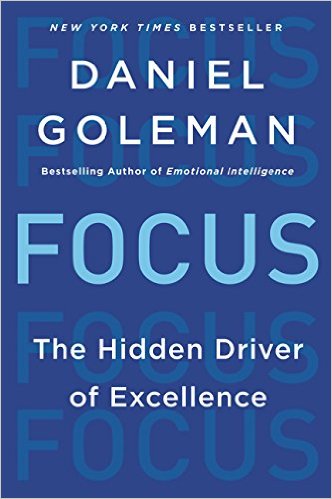I have to admit that I didn’t start reading this book on purpose. It just happened to be in our house, since my wife has read it. I know that Daniel Goleman has another great book called Emotional Intelligence, but I haven’t had a chance to read that book, either.
So, coincidence created the opportunity to read Focus, since I have some time during my gardening leave. (Yes, I am on gardening leave since I am changing my employer. I will continue to be based in Singapore.)
Daniel Goleman starts the book by defining the anatomy of attention and he states boldly that it is important for a child to interact with people to develop the social and emotional circuitry of a child’s brain.
Deep thinking demands sustaining a focused mind, and there are many distractions going on around us every second. For instance, the writer gives the example of Carl Gauss, an eighteenth and nineteenth century mathematician, who worked on proving a theorem for four years with no solution. Then, one day, the answer came to him “as a sudden flash of light.”
The writer discusses self-awareness as a very important feature that leads to success, since you are aware of your weaknesses and you can build a team according to these facts. In addition, overloading the attention shrinks mental control, and we start forgetting the names of people or other valuable information.
Marketers know how to mobilize our brains so that we make some unconscious choices when buying a product. For example, I got a phone call from my favourite football club, Besiktas, yesterday and the voice on the other end of the phone played with my feelings about Besiktas so skilfully that I happened to buy USD 500 worth of Besiktas merchandise just in ten minutes!
The writer discusses that people who are extremely adept at mental tasks that demand cognitive control and active working memory can struggle with creative insights, a point with which I absolutely agree.
He argues that accounts of discoveries tell of them happening during a walk or a bath, on a long ride or vacation. Darwin and Gandhi used to walk a lot to think, and I have been using the same method for more than 20 years now, which has worked for me quite nicely.
Walking clears your mind and focuses you in the present. It is a kind of a meditation.
I would like to share some of my favourite quotes from the book, with my own comments.
“Don’t let the voice of others’ opinions drown out your inner voice. And most important, have the courage to follow your heart and intuition. They somehow already know what you truly want to become.”
Some people can be manipulative and they can be jealous of you. You should always follow your own ideas, even if they turn out to be wrong. Once you make your own mistakes, you can learn from them.
“Self-awareness seems to diminish with promotions up the organisation’s ladder.”
When you are moving up the career ladder, the number of genuine people becomes fewer and fewer, so it is hard to obtain healthy feedback.
“The brain is the last organ of the body to mature anatomically, continuing to grow and shape itself into our twenties.”
“The better their self-control in childhood, the better the Dunedin kids were doing in their thirties. They had sounder health, were more successful financially, and were law-abiding citizens.”
“Those at the top never stop learning; if at any point they start coasting and stop such smart practice, too much of their game becomes bottom up and their skills plateau.”
Never stop learning! If you believe your job is not demanding enough, I always think you should change it. When the learning stops, it is like the music stops and time starts going very slowly. You will always be in that kind of situation from time to time, and it is important to recognise it and to be able to make the change.
“Higher vagal tone, which can result from mindfulness and other meditations, leads to greater flexibility in many ways. People are better able to manage both their attention and their emotions. In the social realm, they can more easily create positive relationships and have effective interactions.”
“Global economic data shows that once a country reaches a modest level of income—there is zero connection between happiness and wealth.”
Absolutely. After a certain amount of income, the rest is for our greed and to feed the soul’s sin.
“Exploration means we disengage from a current focus to search for new possibilities, and allows flexibility, discovery, and innovation. Exploitation takes sustained focus on what you’re already doing, so you can refine efficiencies and improve performance.”
“Being in survival mode narrows our focus.”
“Ambitious revenue targets or growth goals are not a gauge of an organisation’s health—and if they are achieved at a cost to other basics, the long term downsides, like losing star employees, can outweigh short term successes as those costs lead to later failures.”
“People’s grades and the prestige of schools they went to had little or nothing to do with their actual effectiveness.”
I hope you enjoy Focus at some point after reading this short review.
All the best from Turkey.
Sukru Haskan
Twitter: @sukru_haskan
